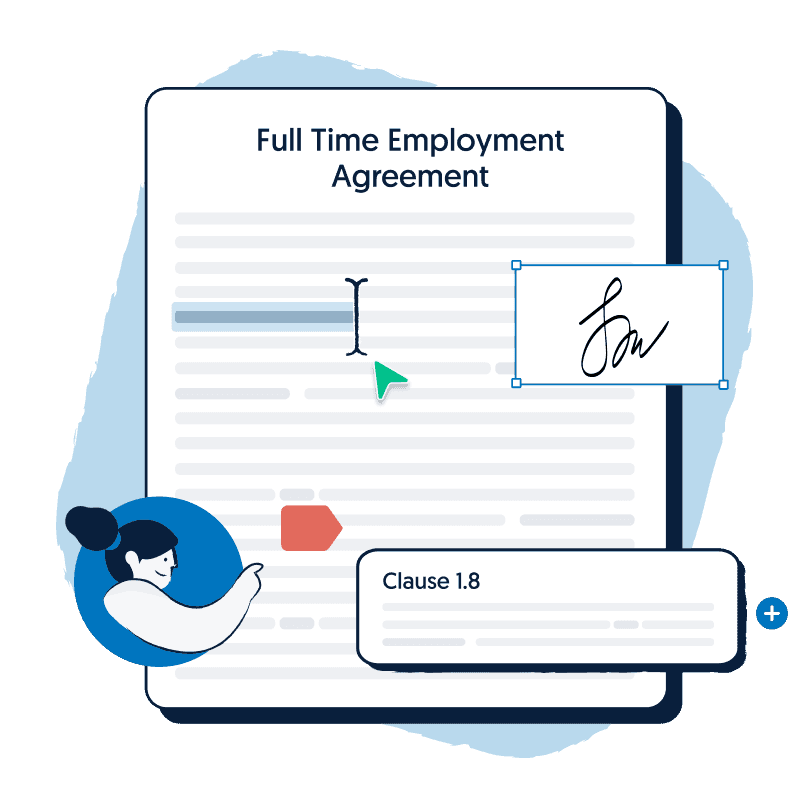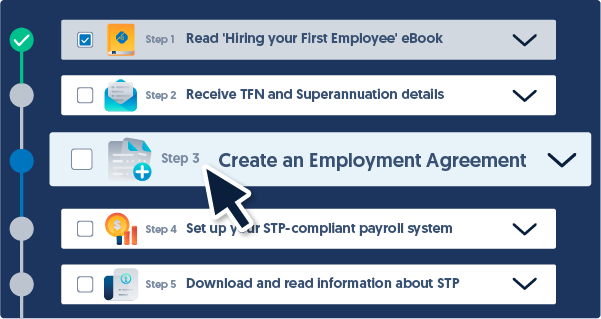You may have heard of the words ‘set-off’ clause before. It’s important that all employers know exactly what this type of clause is, how it works and why you use this clause. It’s quite common for employers to put set-off clauses in employment contracts and there are many reasons why they may do so. So, let’s get right into the employment law world. This legal guide will tell you everything you need to know about set-off clauses, as well as how to draft a successful one.

Get your Full Time Employment Agreement legal document for free.
What are Set-Off Clauses in Employment Contracts?
A set-off clause is an optional clause in an employment contract. It allows the employer to pay their employees with higher base pay rates to accommodate for all the award entitlements that employee is entitled to receive.
In other words, instead of an employer paying their employees the modern award base rate, plus any award entitlements such as overtime, penalty rates, allowances etc, the employer has the option to pay their employees one larger sum that is inclusive of all these benefits.
What does ‘Set-Off’ mean?
Where does the word ‘set-off’ play into this? Well, the legal definition of the term set-off means to put something aside in exchange for something else.
So, if an employer uses a set-off clause they are essentially putting the need to expressly pay these monetary award entitlements aside in exchange for a salary that is inclusive of these entitlements.
Set-Off Clauses are optional
This type of clause is optional. There may be a range of reasons an employer may want to include a set-off clause in an employment contract. Check out the reasons why below.
How do Set-Off Clauses work?
Now, the inner workings of set-off clauses can be a bit tricky. At times, they can be confusing for employers. So let’s break this down.
Each modern award states the minimum or base rate each employee must receive in that industry. These modern awards also state what extra monetary entitlements, or award entitlements these employees must receive, including:
- Overtime pay,
- Allowances,
- Penalty rates and,
- Loading rates.
Legally, each employer must pay their employees the base rate plus these extra monetary entitlements. However, if an employer simply wishes to pay their employees a salary, without expressly paying these award entitlement, this salary must be large enough to compensate or include the payment of these entitlements.
This is where the set-off clauses in employment contracts come out to play. The set-off clause is an agreement, between the employer and employee, that the employee will receive a larger salary or base rate in compensation for not receiving the explicit payment of penalty rates, allowances etc.
Why use Set-Off Clauses?
Set-off clauses in employment contracts can be extremely practical.
All in all, it is much easier to keep track of one employee’s salary in comparison to a base rate with a lot of extras that may need to be paid. So, many employers will choose to use set-off clauses to make their payroll duties easier and smoother. Many businesses and employers opt to use them for higher responsibility positions, such as managerial roles.

Are you looking to hire an employee?
Use our ‘Hire an employee’ workflow to complete and check off all your legal requirements.
Start nowCan I accidentally underpay an employee by using a Set-Off Clause?
Unfortunately, this is always a possibility. You must take extra care when deciding to use a set-off clause in an employment contract.
Even though you are paying your employee a higher base rate of pay, you may still be underpaying them. This can happen in a few ways:
Firstly, it can happen when an employees salary is not the same or is lower than the modern award base rate plus the moderns award extra monetary entitlements.
Secondly, it can happen if your set-off clauses are poorly drafted. Your set-off clause must specifically state which modern award entitlements are being set off or compensated for by that employee’s higher base rate of pay. If it doesn’t, there is always the risk that a Court may find your set-off arrangement is unauthorised and unfair.
How to draft Set-Off Clauses in Employment Contracts
As stated above, the drafting of your set-off clause is extremely important. It must be clear and drafted well. Your clause must state which award entitlement is being set-off.
So, here is what you need to draft a successful set-off clause:
- Figure out which award entitlements you want to set-off against a higher base rate of pay,
- Make sure your clause states or lists which of these award entitlements you are setting-off,
- Ensure the higher base rate of pay is sufficient to compenste that employee for the award entitlements that are being set-off.
If you are considering drafting up a set-off clause for any of your new or existing employees, it’s best to speak to an Employment Lawyer.
Key Takeaways
A set-off clause is a great tool many employers can utilise to pay their employees in accordance with modern awards. A set-off clause will allow employers to offer their employees a higher base rate, or higher salary, that accommodates for an employees award entitlements such as loadings, allowances, penalty rates etc. If you do choose to use a set-off clause in your employment contracts, ensure you are specific as to which award entitlements you are ‘setting off’.

Get a fixed-fee quote from Australia's largest lawyer marketplace.






